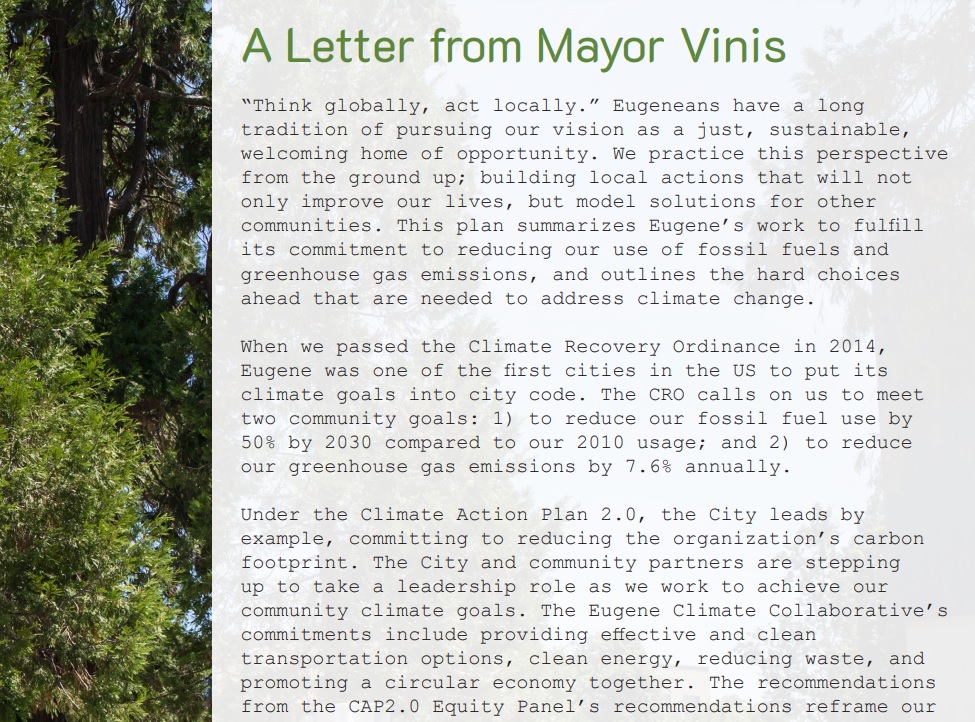Eugene approves 5 new gas stations ‘in defiance’ of its own climate action plan
4 min read
The City of Eugene continues with business as usual, 'in defiance' of its own climate action goals.
During public comment October 25, residents asked the City Council to stop allowing new gas stations in west Eugene.
[00:00:08] Aimée Okotie-Oyekan: My name is Aimée Okotie-Oyekan and I’m an independent consultant working to advance climate justice and community resiliency. I’m also an alternate on the City of Eugene Equity Panel.
A city with known goals for climate actions should not be building the fourth gas station within three years, all within a mile of each other. The 7-Eleven proposal on Polk and Seventh is one that carries adverse climate and environmental justice implications and should be denied. Building more gas stations is the antithesis to the City of Eugene’s climate action plan. We have an opportunity here and a moral imperative to advance robust climate action for our city. A just transition off of fossil fuels is the only way to reduce greenhouse gas emissions, address public health disparities, and improve community access to and participation and climate solutions.
[00:00:56] Ana Molina: My name is Ana Molina and I am the statewide environmental justice project manager for Beyond Toxics. We work on issues relating to environmental justice and have done a lot of work around air quality in West Eugene.
I’m here today to talk about the gas stations that have been approved in the city of Eugene. As a resident of Eugene and an organizer, it really concerns me to see the City has recently approved five large-capacity gas stations: a 7-Eleven at 7th and Polk; a 7-Eleven at 11th and Bailey Hill Road; a 7-Eleven at Highway 99 and Roosevelt; another 7-Eleven at 7th and Garfield; and an Arco on Highway 99 at Roosevelt. All of these gas stations were approved without any notifications and involvement of the community who would be impacted by the construction.
Thank you for supporting
local citizen journalism
By not transitioning off of fossil fuels, we’re not just contributing to the climate crisis, but also exposing residents who live near new gas stations to increased levels of car and truck exhaust and other pollutants containing particulate matters such as benzene, carbon monoxide and much more. Especially when a majority of these gas stations are located in areas where there’s already increased air pollution and people who have health impacts, now is the time to take action to address climate change. And I hope you can look into the problem of approving new gas stations in Eugene.
[00:02:08] Danny Noonan: My name is Danny Noonan…. As someone who lives two blocks away I also ask that you come out in opposition to the new gas station on Seventh and Polk.
[00:02:14] Lisa Arkin: My name is Lisa Arkin, I’m the executive director of Beyond Toxics. In the Eugene Climate Action Plan 2.0, many pages are devoted to stating that the City will do everything it can to transition City operations and the community away from fossil fuel use. In fact, there’s a distinct message that residents are responsible for the majority of emissions from fossil fuel. And the report states, quote: “Emissions are forecasted to reach 3.13 million metric tons of carbon by 2030, if the community continues with its current growth and consumption patterns.” And it goes on to say that the City is doing everything it can help the community to reach its goals.
And yet, despite these proclamations, it’s the City that has recently approved five large capacity gas stations in close proximity to each other. And four of these locations are near middle- to low-income residential neighborhoods. You know, you have to wonder. The City Council has heard residents of West Eugene describe their experiences in poor health due to poor air quality. And yet it continues to permit gas stations, in defiance, I would say, of its own climate action plan. Benzene, which is an emission from car exhaust, is a known carcinogen, as well as carbon monoxide and diesel particulate, and other kinds of particulate matter. Also, benzene is associated with childhood leukemia and multiple myeloma for children within one quarter of a mile of gas stations.
By building gas stations, the city is also turning clean property, former bank sites, into something that will eventually become a brownfield, and possibly not suitable for housing, despite the city’s proclamation that is trying to provide more housing. These sites will have to be cleaned up because of underground gasoline storage tanks. And this is very expensive and usually has to be done through grants.
Mayor Vinis, this is a quote from you in the CAP 2.0 report: ‘ You will have to help make hard choices ahead to address the needed actions for climate change. So I ask each of you to take action now.’
[00:04:33] John Q: Residents ask why the City is allowing new gas stations in West Eugene.





